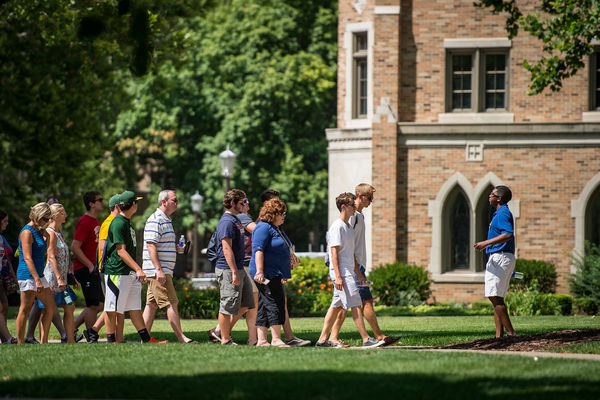The United States is home to some of the world’s most prestigious and diverse colleges and universities, each welcoming thousands of prospective students and visitors every year. Campus tour guides play an essential role in representing their institutions, offering informative and engaging tours that help newcomers understand campus life, academic offerings, and the broader university culture. For immigrants looking to work in the United States, campus tour guiding offers a rewarding entry-level opportunity that emphasizes communication, cultural awareness, and customer service.
Many universities across the U.S. are recognizing the value of diverse voices in shaping campus narratives. Immigrant workers, with their unique perspectives and multilingual capabilities, bring added value to student engagement and campus outreach programs. These institutions are increasingly open to hiring qualified international candidates and offering visa sponsorship, particularly when candidates demonstrate strong interpersonal skills and a commitment to student life. In this guide, we explore what it takes to become a campus tour guide in the U.S., including essential skills, certifications, top-paying regions, salary expectations, and application tips tailored for immigrants seeking visa sponsorship.
Entry-Level Skills/Experience Required
To become a campus tour guide in the U.S., especially as an immigrant seeking visa sponsorship, candidates must showcase a mix of personality, communication ability, and organizational skills. Here are the essential qualifications:
- Strong Communication Skills: This is the core of the role. As a tour guide, you’ll be speaking to diverse audiences, including prospective students, parents, and guests. Clear, confident, and engaging speech is key.
- Customer Service Orientation: A background in customer service or any client-facing role is highly beneficial. Guides must be welcoming, approachable, and able to answer questions patiently.
- Cultural Sensitivity and Diversity Awareness: Universities are diverse environments. Demonstrating respect for different cultures and traditions enhances your value as a campus ambassador.
- Public Speaking or Presentation Experience: Even informal experience giving presentations in school or community settings is an advantage. It shows you’re comfortable speaking in front of groups.
- Multilingual Abilities: Being fluent in languages other than English—especially Spanish, Mandarin, Arabic, or Hindi—can make you a standout candidate.
- Basic Knowledge of U.S. Higher Education: Understanding how college admissions, programs, and student services work in the U.S. helps when answering visitor questions.
- Professionalism and Reliability: Tour guides are trusted to represent the institution. Being punctual, responsible, and professionally dressed are key expectations.
- Use of Technology: Some universities use tablets, apps, or digital systems during tours. Basic tech literacy is a plus.
- Familiarity with Campus or Academic Environment: Whether you’re a current student, graduate, or have worked in education, familiarity with university settings will be helpful.
Certifications Needed to Work
Most campus tour guide roles do not require formal certifications, especially for entry-level applicants. However, there are some credentials and optional trainings that can improve employability:
- Campus Tour Guide Training Program: Some colleges offer in-house training and certification, often required after hiring. This includes safety protocols, tour scripting, and FAQ preparation.
- Customer Service Certification: Online platforms like Coursera or edX offer certificates in customer service which are useful for job seekers without formal experience.
- Public Speaking or Communication Courses: Completing a Toastmasters course or a similar public speaking workshop can add to your resume.
- Foreign Credential Evaluation: Use services like WES to validate non-U.S. academic qualifications.
- English Proficiency Exams: For non-native speakers, having a valid TOEFL or IELTS score can support your communication credibility.
Regions with the Highest Payment Structures
Certain regions and universities across the United States offer more competitive pay for campus tour guides due to higher costs of living and institutional prestige. Here are the top 5:
- California (e.g., UCLA, Stanford): Campus guides in this region can earn up to $20–$25/hour, especially in tech-integrated or private universities.
- Massachusetts (e.g., Harvard, MIT): Tour guides at elite institutions here often earn between $18 and $23/hour with bonuses for multilingual skills.
- New York (e.g., NYU, Columbia): Due to high living costs, pay ranges from $18 to $24/hour, often with additional stipends or perks.
- Illinois (e.g., University of Chicago, Northwestern): Salaries are slightly lower ($16–$21/hour) but often include travel reimbursements and performance incentives.
- Texas (e.g., UT Austin, Rice University): With growing university investments, tour guides can expect $15–$20/hour and paid training sessions.
Salary Expectations for Immigrants
| Region | Average Hourly Pay | Annual Estimate (Full-Time Equivalent) | Notable Benefits |
|---|---|---|---|
| California | $22 | $45,760 | Paid breaks, tech stipends, work-study opportunities |
| Massachusetts | $21 | $43,680 | Language bonuses, student housing discounts |
| New York | $20.50 | $42,640 | Health insurance, commuter benefits |
| Illinois | $19 | $39,520 | Performance bonuses, travel reimbursements |
| Texas | $18 | $37,440 | Paid training, professional development workshops |
Campus tour guide salaries for immigrant workers range from $15 to $25 per hour depending on the region and institution. While many positions are part-time or seasonal, full-time roles exist at larger universities or within admissions departments. These jobs often include benefits like flexible scheduling, stipends for languages spoken, and access to student support services.
How To Apply for Campus Tour Guide Jobs in United States for Immigrants
Here’s a step-by-step guide to applying for campus tour guide jobs in the U.S. as an immigrant:
- Assess Your Eligibility and Skills: Review your communication, customer service, and tech skills. Consider completing an online course to strengthen weak areas.
- Prepare U.S.-Format Resume and Cover Letter: Tailor your resume to highlight speaking skills, cultural engagement, and campus familiarity.
- Search for Jobs on University Sites and Job Boards:
- HigherEdJobs
- Indeed
- Handshake (mainly for students or recent grads)
- ChronicleVitae
- LinkedIn Jobs
- Focus on Visa-Sponsoring Institutions: Large and international universities often have pathways for work visa sponsorship. Look for schools with global outreach or high international student populations.
- Apply Through Campus HR Portals: Submit applications directly through each university’s human resources or admissions job board.
- Prepare for Virtual Interviews: Be ready to speak about your background, experience with diverse groups, and why you’re passionate about student life and engagement.
- Understand the Visa Process: For tour guide roles, F-1 (OPT), J-1, and occasionally H-1B visas may apply. Ask the employer early about their sponsorship policy.
Conclusion
Working as a campus tour guide in the United States offers immigrants a unique opportunity to blend communication, service, and cultural engagement in a fulfilling role. These jobs are ideal for individuals who enjoy storytelling, interacting with people, and being part of educational communities. With the rise in international student recruitment and diversity initiatives, many universities now see the value in hiring immigrants who can relate to a wide range of prospective students.
From gaining entry-level experience to establishing long-term professional networks, being a campus tour guide can be a stepping stone to broader career opportunities in education, communication, and student affairs. By focusing on high-paying regions, obtaining relevant training, and using the right platforms to apply, immigrant candidates can navigate the U.S. employment landscape with confidence and clarity.

